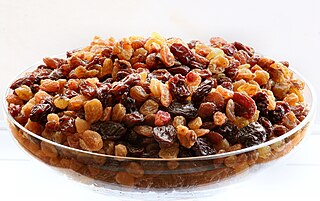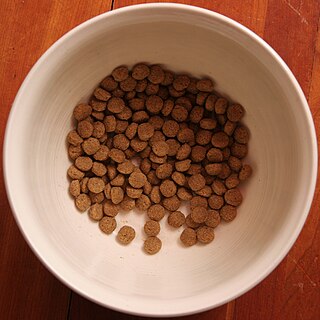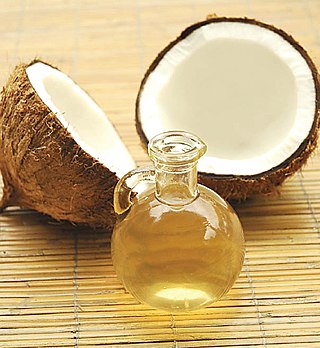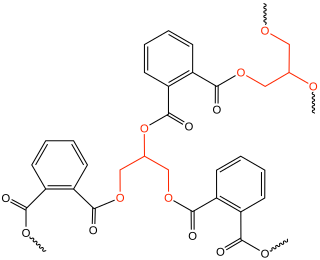Related Research Articles

Wood is a structural tissue found in the stems and roots of trees and other woody plants. It is an organic material – a natural composite of cellulose fibers that are strong in tension and embedded in a matrix of lignin that resists compression. Wood is sometimes defined as only the secondary xylem in the stems of trees, or more broadly to include the same type of tissue elsewhere, such as in the roots of trees or shrubs. In a living tree it performs a support function, enabling woody plants to grow large or to stand up by themselves. It also conveys water and nutrients between the leaves, other growing tissues, and the roots. Wood may also refer to other plant materials with comparable properties, and to material engineered from wood, woodchips, or fiber.

A raisin is a dried grape. Raisins are produced in many regions of the world and may be eaten raw or used in cooking, baking, and brewing. In the United Kingdom, Ireland, New Zealand, Australia and South Africa, the word raisin is reserved for the dark-colored dried large grape, with sultana being a golden-colored dried grape, and currant being a dried small Black Corinth seedless grape.

Buttermilk is a fermented dairy drink. Traditionally, it was the liquid left behind after churning butter out of cultured cream. As most modern butter in western countries is not made with cultured cream but uncultured sweet cream, most modern buttermilk in western countries is cultured separately. It is common in warm climates where unrefrigerated milk sours quickly.

Dog food is food specifically formulated and intended for consumption by dogs and other related canines. Dogs are considered to be omnivores with a carnivorous bias. They have the sharp, pointed teeth and shorter gastrointestinal tracts of carnivores, better suited for the consumption of meat than of vegetable substances, yet also have ten genes that are responsible for starch and glucose digestion, as well as the ability to produce amylase, an enzyme that functions to break down carbohydrates into simple sugars – something that obligate carnivores like cats lack. Dogs evolved the ability living alongside humans in agricultural societies, as they managed on scrap leftovers and excrement from humans.

Coconut oil is an edible oil derived from the kernels, meat, and milk of the coconut palm fruit. Coconut oil is a white solid fat below around 25 °C (77 °F), and a clear thin liquid oil in warmer climates. Unrefined varieties have a distinct coconut aroma. Coconut oil is used as a food oil, and in industrial applications for cosmetics and detergent production. The oil is rich in medium-chain fatty acids.

Silage is a type of fodder made from green foliage crops which have been preserved by fermentation to the point of acidification. It can be fed to cattle, sheep, and other such ruminants. The fermentation and storage process is called ensilage, ensiling, or silaging. Silage is usually made from grass crops, including maize, sorghum, or other cereals, using the entire green plant.

Stearic acid is a saturated fatty acid with an 18-carbon chain. The IUPAC name is octadecanoic acid. It is a soft waxy solid with the formula CH3(CH2)16CO2H. The triglyceride derived from three molecules of stearic acid is called stearin. Stearic acid is a prevalent fatty-acid in nature, found in many animal and vegetable fats, but is usually higher in animal fat than vegetable fat. It has a melting point of 69.4 °C and a pKa of 4.50.

A paper machine is an industrial machine which is used in the pulp and paper industry to create paper in large quantities at high speed. Modern paper-making machines are based on the principles of the Fourdrinier Machine, which uses a moving woven mesh to create a continuous paper web by filtering out the fibres held in a paper stock and producing a continuously moving wet mat of fibre. This is dried in the machine to produce a strong paper web.

Safflower is a highly branched, herbaceous, thistle-like annual plant in the family Asteraceae. It is commercially cultivated for vegetable oil extracted from the seeds and was used by the early Spanish colonies along the Rio Grande as a substitute for saffron. Plants are 30 to 150 cm tall with globular flower heads having yellow, orange, or red flowers. Each branch will usually have from one to five flower heads containing 15 to 20 seeds per head. Safflower is native to arid environments having seasonal rain. It grows a deep taproot which enables it to thrive in such environments.
Biodiesel production is the process of producing the biofuel, biodiesel, through the chemical reactions of transesterification and esterification. This involves vegetable or animal fats and oils being reacted with short-chain alcohols. The alcohols used should be of low molecular weight. Ethanol is the most used because of its low cost, however, greater conversions into biodiesel can be reached using methanol. Although the transesterification reaction can be catalyzed by either acids or bases, the base-catalyzed reaction is more common. This path has lower reaction times and catalyst cost than those acid catalysis. However, alkaline catalysis has the disadvantage of high sensitivity to both water and free fatty acids present in the oils. August 10 is international biodiesel day
Rendering is a process that converts waste animal tissue into stable, usable materials. Rendering can refer to any processing of animal products into more useful materials, or, more narrowly, to the rendering of whole animal fatty tissue into purified fats like lard or tallow. Rendering can be carried out on an industrial, farm, or kitchen scale. It can also be applied to non-animal products that are rendered down to pulp. The rendering process simultaneously dries the material and separates the fat from the bone and protein, yielding a fat commodity and a protein meal.

Freeze drying, also known as lyophilization or cryodesiccation, is a low temperature dehydration process that involves freezing the product and lowering pressure, thereby removing the ice by sublimation. This is in contrast to dehydration by most conventional methods that evaporate water using heat.

Cat food is food specifically designed for consumption by cats. As obligate carnivores, cats have specific requirements for their dietary nutrients, namely nutrients found only in meat, such as taurine, arginine, and Vitamin B6. Certain nutrients, including many vitamins and amino acids, are degraded by the temperatures, pressures and chemical treatments used during manufacture, and hence must be added after manufacture to avoid nutritional deficiency.

Shea butter is a fat extracted from the nut of the African shea tree. It is ivory in color when raw and commonly dyed yellow with borututu root or palm oil. It is widely used in cosmetics as a moisturizer, salve or lotion. It is edible and is used in food preparation in some African countries. It is occasionally mixed with other oils as a substitute for cocoa butter, although the taste is noticeably different.
Tall oil, also called liquid rosin or tallol, is a viscous yellow-black odorous liquid obtained as a by-product of the kraft process of wood pulp manufacture when pulping mainly coniferous trees. The name originated as an anglicization of the Swedish tallolja. Tall oil is the third largest chemical by-product in a kraft mill after lignin and hemicellulose; the yield of crude tall oil from the process is in the range of 30–50 kg / ton pulp. It may contribute to 1.0–1.5% of the mill's revenue if not used internally.

An alkyd is a polyester resin modified by the addition of fatty acids and other components. Alkyds are derived from polyols and organic acids including dicarboxylic acids or carboxylic acid anhydride and triglyceride oils. The term alkyd is a modification of the original name "alcid", reflecting the fact that they are derived from alcohol and organic acids. The inclusion of a fatty acid confers a tendency to form flexible coatings. Alkyds are used in paints, varnishes and in moulds for casting. They are the dominant resin or binder in most commercial oil-based coatings. Approximately 200,000 tons of alkyd resins are produced each year. The original alkyds were compounds of glycerol and phthalic acid sold under the name Glyptal. These were sold as substitutes for the darker-colored copal resins, thus creating alkyd varnishes that were much paler in colour. From these, the alkyds that are known today were developed.

Pears Glycerin soap is a British brand of soap first produced and sold in 1807 by Andrew Pears, at a factory just off Oxford Street in London. It was the world's first mass-market translucent soap. Under the stewardship of advertising pioneer Thomas J. Barratt, A. & F. Pears initiated a number of innovations in sales and marketing. English actress and socialite Lillie Langtry was recruited to become the poster-girl for Pears in 1882, and in doing so she became the first celebrity to endorse a commercial product.
Deinking is the industrial process of removing printing ink from paperfibers of recycled paper to make deinked pulp.
In agriculture, grain quality depends on the use of the grain. In ethanol production, the chemical composition of grain such as starch content is important, in food and feed manufacturing, properties such as protein, oil and sugar are significant, in the milling industry, soundness is the most important factor to consider when it comes to the quality of grain. For grain farmers, high germination percentage and seed dormancy are the main features to consider. For consumers, properties such as color and flavor are most important.

Pilu oil is an extract from seeds of the Pilu tree, also known as the toothbrush tree. It is used for soaps, detergents, and resist dyeing.
References
- ↑ "A Consumer Affairs Report 2014" (PDF). Retrieved 31 October 2023.
- ↑ "Why is it Important to Know the TFM Value on Your Soap?". Cureskin. 18 June 2021. Retrieved 31 October 2023.